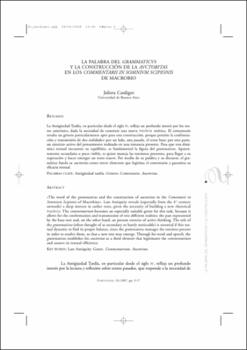La palabra del "grammaticus" y la construcción de la "auctoritas" en los "Commentarii in Somnium Scipionis" de Macrobio
Autor
Cardigni, JulietaFecha
2007Resumen
La Antigüedad Tardía, en particular desde el siglo IV, refleja un profundo interés por los textos anteriores, dada la necesidad de construir una nueva paideiva retórica. El comentario resulta un género particularmente apto para esta construcción, porque permite la confrontación y transmisión de dos realidades: por un lado, una pasada, el texto base; por otra parte, un ejercicio activo del pensamiento realizado en una instancia presente. Para que esta dinámica textual encuentre su equilibrio, es fundamental la figura del grammaticus. Aparentemente secundaria o poco visible, es quien maneja las tensiones presentes, para llegar a su superación y hacer emerger un texto nuevo. Por medio de su palabra y su discurso, el gramático funda su auctoritas como tercer elemento que legitima el comentario y garantiza su eficacia textual Late Antiquity reveals (especially from the 4th century onwards) a deep interest in earlier texts, given the necessity of building a new rhetorical paideiva. The commentarium becomes an especially suitable genre for this task, because it allows for the confrontation and transmission of two different realities: the past represented by the base-text and, on the other hand, an present exercise of active thinking. The role of the grammaticus (often thought of as secondary or barely noticeable) is essential if this textual dynamic to find its proper balance, since the grammaticus manages the tensions present
in order to resolve them, so that a new text may emerge. Through his word and speech, the
grammaticus establishes his auctoritas as a third element that legitimates the commentarium
and assures its textual efficiency





